New Jersey Wine 101: It’s Time to Take a Look at New Jersey Wine
When I emailed my friend and wine-aficionado-buddy, Frank, who’s lived in New Jersey his entire life to get recommendations of New Jersey wineries to visit during my first-ever trip to sample the state’s wine, his response was “New Jersey makes wine?”
So, you’re not alone if you didn’t know New Jersey makes wine.
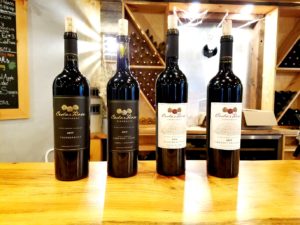
Photo Credit: Wine Casual, Fine wines are being produced in New Jersey such as these wines by Cedar Rose Vineyards.
And now that you know, you should be pleased to learn that there are some pretty excellent wines being made in the state.
But where to begin?
If you’re looking to go winetasting in New Jersey, and you want to sample wines from some of the top wineries, start here.
If you want to learn a little more about New Jersey’s wine industry overall, keep reading.
This article covers everything I would have wanted to know before I visited New Jersey wineries for the first time to better understand the state’s wine scene.
A Brief New Jersey Wine Overview
One of the original 13 colonies, New Jersey has grown grapes since the 1700s.
While the state has produced American and hybrid grapes (e.g., chambourcin, vidal blanc, vignoles) for most of its history, only in the last 40 years has New Jersey grown vinifera grapes (e.g., cabernet sauvignon, chardonnay, merlot).
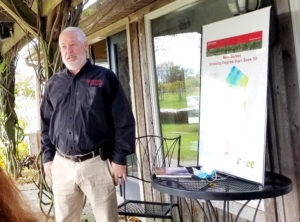
Photo Credit: Wine Casual, According to Daniel Ward, Rutgers Extension Specialist and Director of the New Jersey Center for Wine Research, New Jersey buys more wine by the bottle over $25 than any other state.
In 2017, New Jersey ranked 5th in the United States for wine consumption with 3.6 gallons consumed per person compared to the national average of 2 gallons.
And while the state consumes a whopping 33 million gallons of wine a year, less than 3% of that wine is made from New Jersey grapes.
New Jersey residents purchase higher-priced wine than the national average due in part to the state’s high median income.
Daniel Ward, Rutgers Extension Specialist and Director of the New Jersey Center for Wine Research notes, “New Jersey buys more wine by the bottle over $25 than any other state.”
You might think that fact alone would lead to a proliferation of wineries and grape growers across the state, but that would only be partially true.
The Economics of Growing Grapes & Making Wine in New Jersey
The New Jersey Farm Winery Act of 1981 made it possible for New Jersey farms with at least three acres of grapes under vine to produce and sell wine.
Blossoming from 7 wineries in 1981 the state currently hosts 64 wineries, but the demand for New Jersey grapes by wineries cannot keep up with the limited supply of grapes being produced by grape growers.
As of 2018, there were only 2,000 acres of grapes under vine in New Jersey of the more than 1 million acres that have been identified by the state as suitable for quality grape growing
The challenge comes down to economics.
The dollar value of grapes per acre is currently less than that of other popular New Jersey agricultural products such as blueberries, tomatoes and bell peppers.

Table: Selected NJ crops value per acre (USDA 2010) from the book, Wine Grape Varieties for New Jersey by Lawrence Coia and Daniel Ward.
Additionally, the cost to grow premium grapes in New Jersey is relatively high with the first 5-year costs to establish a 10-acre vineyard hovering around $250,000 with break-even occurring typically in 8-13 years.
Nonetheless many New Jersey farms have made the switch from growing vegetables to growing grapes due in part to pressure from other domestic and international vegetable markets, and because growing grapes and producing wine can potentially be more lucrative than vegetable farming.
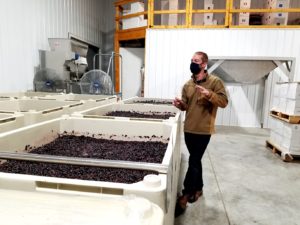
Photo Credit: Wine Casual, “Wine is a value-added product. Farm-fermented beverages are the way farmers can survive,” notes Mike Beneduce, Jr., Winemaker and Vineyard Manager of Beneduce Vineyards.
To make producing wine work financially, New Jersey wineries can’t compete in the $10 and under wine category.
$15-$25 a bottle is the sweet spot for New Jersey wine pricing with premium wines often priced between $25-$50.
It’s helpful to know the realities of the New Jersey wine market before you head out winetasting so your expectations are properly set before you get to the register.
Grape Growing in New Jersey
![Photo Credit: Rutgers, Longtime Rutgers University Agriculture & Natural Resources County Agent, Gary Pavlis, affirms the comparison of New Jersey's soils, growing season and temperatures to that of Bordeaux noting, “Our cabs [cabernet sauvignons] retain acidity much like Bordeaux.” Wine Casual](https://winecasual.com/wp-content/uploads/2020/12/Gary-Pavlis-1-300x225.jpg)
Photo Credit: Rutgers Photo Credit: Rutgers, Longtime Rutgers University Agriculture & Natural Resources County Agent, Gary Pavlis, affirms the comparison of New Jersey’s soils, growing season and temperatures to that of Bordeaux noting, “Our cabs [cabernet sauvignons] retain acidity much like Bordeaux.”
Most vineyard soil in New Jersey is composed of well-draining, sandy loam largely consisting of sand and gravel.
New Jersey winemakers are quick to compare New Jersey to Bordeaux because both areas share similar soils, length of growing season and temperatures.

Photo Credit: Wine Casual, Winery owner, William (Bill) Heritage describes their sustainability vineyard practices that earned them a sustainability certification from the State of New Jersey.
Longtime Rutgers University Agriculture & Natural Resources County Agent, Gary Pavlis, affirms the comparison’s relevance noting, “Our cabs [cabernet sauvignons] retain acidity much like Bordeaux.”
If you’re looking to sample the most Bordeaux-like wines produced in New Jersey, a visit to Amalthea Cellars is mandatory.
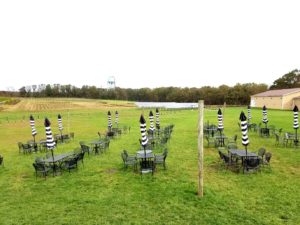
Photo Credit: Solar panels (in the rear right) at Sharrott Winery provide 30% of the winery’s power.
The winery’s longtime founder and owner, Louise Caracciolo, served as a consultant to Chateau Margaux in 1986 and his red blends are eminently old-world inspired.
Because of New Jersey’s Atlantic-Ccean-driven humidity, grapes cannot be grown biodynamically because of mildew disease pressure.
Birds, specifically starlings, are vertebrate-pest number one for New Jersey wineries followed by deer.
This year at Auburn Road Vineyards starlings took out 25% of its vineyard crop.
Tomasello Winery employs a number of deterrents including lasers to protect its vineyards from damage by birds.
Sustainability is important to New Jersey wineries such as William Heritage Winery which holds a sustainability certification by the state due to its environmentally-friendly farming practices.
Sharrott Winery hosts a solar panel grid which provides 30% of the winery’s power.
New Jersey American Viticultural Areas (AVAs)
New Jersey has four American Viticultural Areas (AVAs) including one sub-AVA:
- Warren Hills
- Central Delaware Valley
- Outer Coastal Plain (OCP)
- Cape May Peninsula (a sub-AVA of OCP)
The Outer Coastal Plain is the largest AVA in the state encompassing 70% of grape production.
New Jersey Grape Varieties
New Jersey grows 83 different grape varieties with vinifera grapes representing 70% of all plantings.
Below are the state’s leading grape varieties.
White Grapes
- Albariño
- Chardonnay
- Gruner Veltliner
- Petit Manseng
- Riesling
Red Grapes
- Cabernet Franc
- Cabernet Sauvignon
- Pinot Noir
- Merlot
- Petit Verdot
- Blaufränkisch
French-American Hybrids
- Chambourcin
- Vidal Blanc
- Vignoles
New Jersey’s Signature Grape Variety is Still Up for Grabs

Photo Credit: Wine Casual, “What’s the best variety for New Jersey? You’re not going to find it; it’s blends,” offers Lawrence Coia, grape grower and owner of Coia Vineyards and co-author of the book Wine Grape Varieties for New Jersey.
If you ask five different New Jersey winemakers to name the state’s signature grape variety you’ll get six different answers.
“What’s the best variety for New Jersey? You’re not going to find it; it’s blends,” offers Lawrence Coia, grape grower and owner of Coia Vineyards and co-author of the book Wine Grape Varieties for New Jersey.

Photo Credit: Wine Casual, (L-R) Scott Quarella and his father Jim Quarella of Bellview Winery. Jim thinks chambourcin has a future in the state despite those who have preconceptions about the hybrid grape. “You don’t like chambourcin? Taste mine, and it’ll just be one more you don’t like.”
Cabernet franc is grown widely across the state and could be a strong contender for New Jersey’s signature grape variety.
When asked if there is a unifying New Jersey cabernet franc style, Bellview Winery owner Jim Quarella does not think there is currently, but he feels wineries can distinguish themselves by how they grow cabernet franc and manage pyrazines so as not to have green pepper notes.
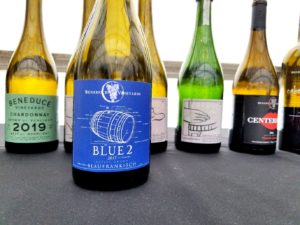
Photo Credit: Mike Beneduce Jr., Winemaker and Vineyard Manager at Beneduce Vineyards feels Blaufrankisch has a future in New Jersey.
Jim thinks chambourcin has a future in the state, and he challenges those who have preconceptions about the hybrid grape to be open to trying modern expressions.
“You don’t like chambourcin? Taste mine, and it’ll just be one more you don’t like.”

Photo Credit: Wine Casual, Nick Sharko, Winegrower at Alba Vineyard feels pinot noir could be in the state’s future noting, “The next push for New Jersey is exploring different pinot noirs.”
Jim’s son, Scott Quarella acknowledges that it is still early days for vinifera grape varieties in New Jersey, “The goal is to find grape varieties we can hang our hat on.”
“We think we’re in the sweet spot of cabernet franc [in New Jersey] between the [New York] Finger Lakes and Virginia,” notes Mark Carduner, co-owner of Working Dog Winery who produces an impressive cabernet franc.
Beneduce Vineyards’ Winemaker and Vineyard Manager, Mike Beneduce Jr., feels blaufränkisch has a future in the state because, “You can do [grow] blaufränkisch from north to south in New Jersey,” though he also recognizes, “Everything we’re doing in New Jersey is an experiment.”
Nick Sharko, Winegrower at Alba Vineyard feels pinot noir could be in the state’s future.
“The next push for New Jersey is exploring different pinot noirs.”
After having sampled several New Jersey still and sparkling wines made from pinot noir, Nick’s prediction does seem to have some legs.
But there is still no consensus on the state’s signature grape variety.
The Winemaker’s Co-Op and New Jersey’s Fine-Wine Movement

Photo Credit: Courtesy of David Furer, Winemaker’s Co-Op Members (L-R), William & Penni Heritage, William Heritage Winery Owners, John Cifelli, Winemaker’s Co-Op Executive Director, Conor Quilty, Unionville Vineyards Winemaker; Mark Carduner, Working Dog Winery Owner; Mike Beneduce Jr., Beneduce Vineyards Winemaker & Vineyard Manager; and Todd Wuerker, Hawk Haven Vineyard Owner & Winemaker.
A group of five wineries is leading New Jersey’s fine-wine movement that aims to champion the production of dry and classically off-dry wines made from vinifera grapes.
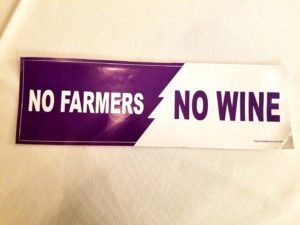
Photo Credit: Wine Casual, The Winemaker’s Co-Op advocates for New Jersey wine and grape growers with the unofficial bumper-sticker slogan, “No Farmers, No Wine!”
The Winemaker’s Co-Op advocates for New Jersey wine and grape growers with the unofficial bumper-sticker slogan, “No Farmers, No Wine!”
Co-Op members commit to holding a minimum of 51% of their portfolio wines to the vinifera fine-wine standard and actively work to advance fine winemaking in the state.
The Co-Op is clear about its desire to preserve New Jersey farmland and the economic realities associated with that desire.
Co-Op Executive Director, John Cifelli, notes that in order to preserve New Jersey farmland and expand vineyard land in the state, fine wine from New Jersey needs to be priced at $30-$50 a bottle to make grapes economically viable for grape growers.
Each year Co-Op member wineries pool together 2.5 tons of their chardonnay and cabernet grapes and create individual wine expressions as part of a “grown communally, fermented individually” wine experiment to promote fine winemaking in the state.
After tasting wines made by Co-Op members collectively and individually, you definitely come away with the sense that fine wine making in the state is headed in the right direction due in part to the Co-Op’s efforts and leadership.
If you want to experience fine winemaking in New Jersey, Co-Op member wineries are a good place to start.
Winemaker Co-Op Member Wineries
- Beneduce Vineyards
- Hawk Haven Vineyard
- Unionville Vineyards
- Working Dog Winery
- William Heritage Winery
New Jersey’s Unfolding Wine Future

Photo Credit: Wine Casual, When asked what should someone think after trying New Jersey wine for the first time, BJ Vinton, Owner White Horse Winery offers, “Maybe you don’t tell them it’s a New Jersey wine.”
So, what should someone think after trying New Jersey wine for the first time?
This is a question I posed to BJ Vinton, owner of White Horse Winery.
BJ offered, “Maybe you don’t tell them it’s a New Jersey wine” to keep them from bringing any pre-conceptions to their tasting experience.
And there is truth in BJ’s words.
New Jersey wine is still in its early days, and it’s unfair to compare New Jersey wine to wine from regions of the world that have been growing vinifera grapes for over 100 years.
While New Jersey’s signature wine identity is still in the making, I’d offer two thoughts to the community of wineries and grape growers who are currently shaping the state’s wine industry.
First, no region ever distinguished itself in wine based on its hybrid grapes.
And any region that ever attempted to do so would do it at the overall expense and cannibalization of its more lucrative vinifera-grape market.
Second, every wine region needs a signature variety and identity to market itself in the long-term and to serve as a shortcut for consumers in a crowded wine market.
Think California cabernet, Oregon pinot noir, Finger Lakes riesling.
New Jersey [insert grape variety here] is still up for grabs.
And this is OK for now.
New Jersey wine is in its early days.
And because of this it’s a great time to drink in and be a part of the state’s unfolding wine future.
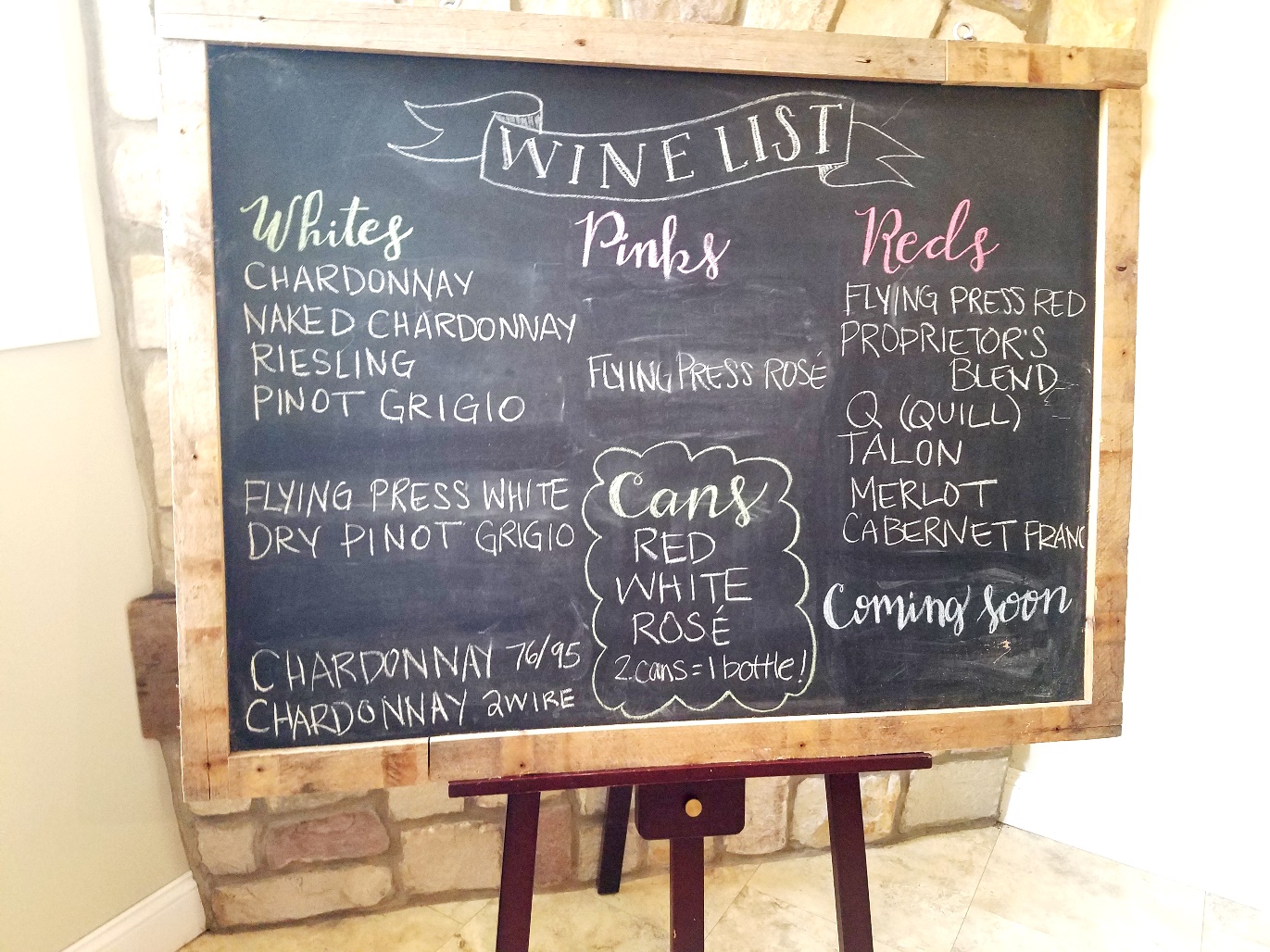
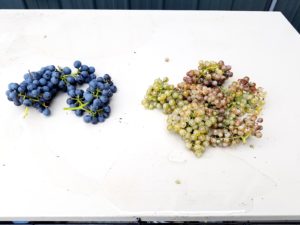
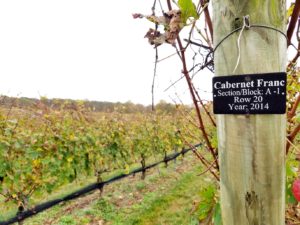
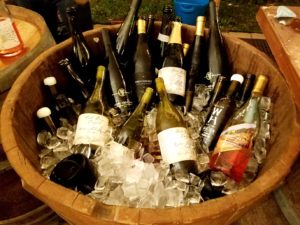
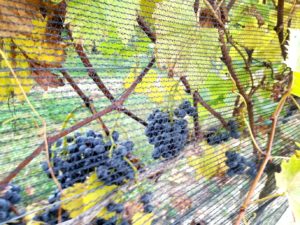
Pingback: A Wine Geek’s Guide to 14 Top New Jersey Wineries and Choice Wines to Try During Your Winetasting Visits - Wine Casual
Pingback: Blaufränkisch and New Jersey’s Take on a Grape Made Popular by Austria - Wine Casual